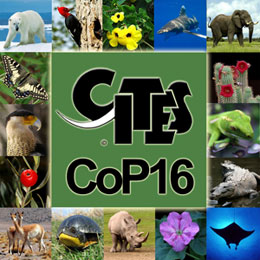 The upcoming sixteenth meeting of the Conference of the Parties to CITES (Bangkok, Thailand, 3-14 March 2013) will be considering 70 proposals to increase or decrease controls on international trade in wildlife and wildlife products, submitted by 55 States from around the world. In total around 320 species are affected by these proposed changes. Amongst the species involved are polar bear, African elephant, white rhinoceros, turtles, frogs, crocodiles, several shark species, the manta ray, valuable tropical timbers, ornamental and medicinal plants and many other animals and plants.
The upcoming sixteenth meeting of the Conference of the Parties to CITES (Bangkok, Thailand, 3-14 March 2013) will be considering 70 proposals to increase or decrease controls on international trade in wildlife and wildlife products, submitted by 55 States from around the world. In total around 320 species are affected by these proposed changes. Amongst the species involved are polar bear, African elephant, white rhinoceros, turtles, frogs, crocodiles, several shark species, the manta ray, valuable tropical timbers, ornamental and medicinal plants and many other animals and plants.
The CITES Secretariat has just released its own recommendations (based upon the agreed amendment criteria) to CITES members (Parties) concerning these proposals.
As instructed by the Parties to the Convention, the Secretariat consulted bodies concerned with the conservation and sustainable use of marine species and timber species about these proposals. Eleven inter-governmental bodies responded including the Food and Agriculture Organization of the United Nations (FAO) who convened an Expert Advisory Panel over 6 days to examine the proposals related to commercially-exploited aquatic species in detail. The full text of the FAO Panel’s report and the responses from other inter-governmental bodies have also been released on the CITES website.
Governments will use these evaluations and recommendations to make their own decisions about which proposals should be adopted and which rejected.
“CITES Parties now have comprehensive appraisals and recommendations on these amendment proposals at their disposal” said CITES Secretary-General John E. Scanlon. “The debates are certain to be rich and varied, supported by the best scientific advice that is available” he added.